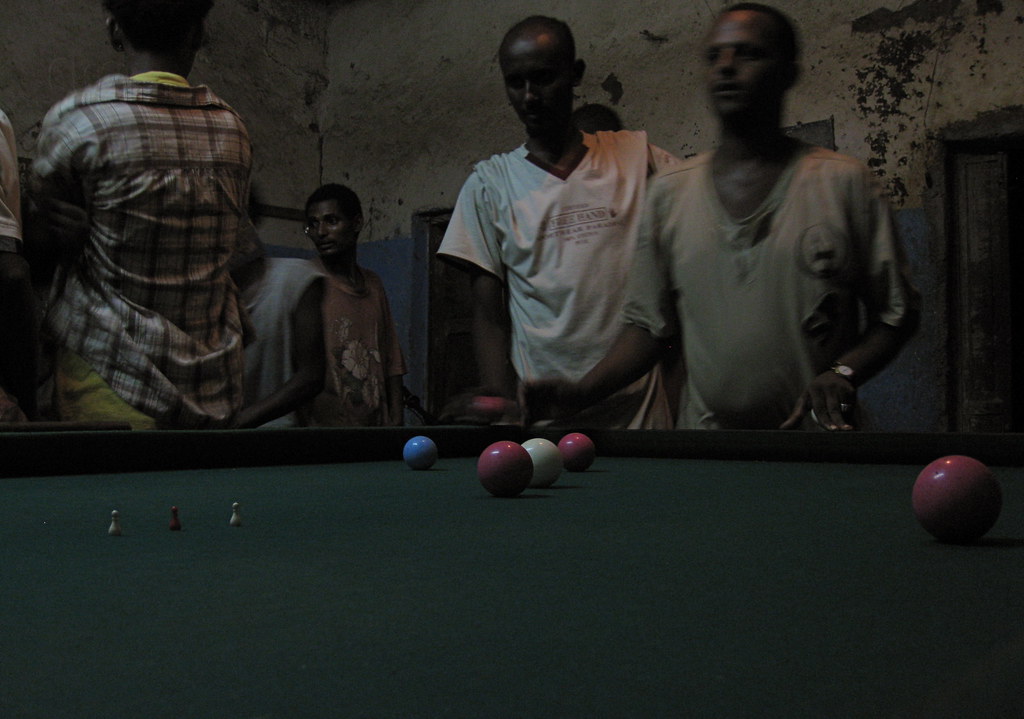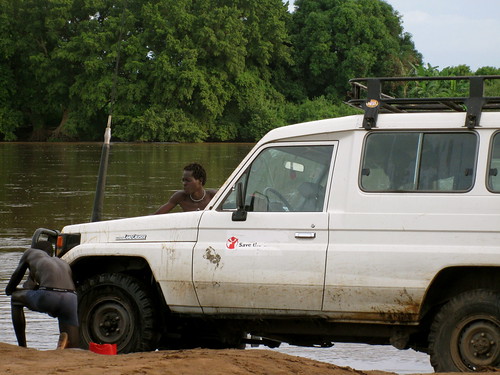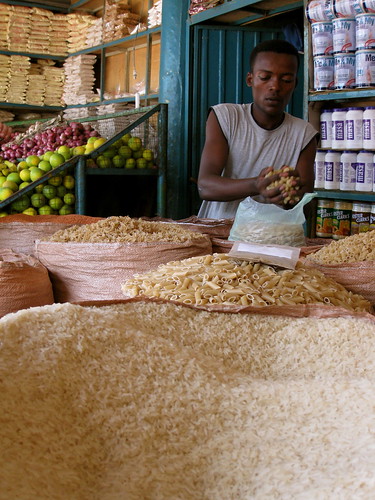We had an evening as well as the full next day to putz around in the small town while we waited for the other crew to join us by car. The first night, we took a somewhat unsatisfactory meal (cold beef and potatoes) at the hotel and went into the town center where the market is. David and I went into a sort of dive bar (if such things really exist in rural Ethiopia) while Duncan did some printing next door at our contact, Teshome’s, shop. I sat down on a wooden bench against the wall of a small dark room that smelled like a locker room with stale beer poured across the floor and hazy cigarette smoke wafting in the air.
The main attractions in the room were two long tables that resembled pool tables with six undersized pockets. Teshome was challenging another guy to a game that’s name I can never remember. It took a while to figure out how the game is played, but it seemed to be a cross between pool and bocce. Players take turns throwing four balls at a blue target ball. At a base level, players must send their ball across the table to get it closest to the target ball while knocking the other player’s ball away. In the middle of the table, three tiny plastic pins resembling miniature bowling pins. A player received four points for knocking any of the pins over after hitting the target ball and two points for getting any of his opponent’s balls in a pocket. Each game takes about a minute and a half and players play until the winner reaches a specified number of points. A referee, who collects money from each player as well as bets from those watching the game, pays out the winner of the match and the process starts again with two players.

The next morning I hit the market early. The market is pretty small compared to others—some used clothing, tailors, and vegetables. I went to the other side to find a guy who makes rubber sandals out of used tires. He took my foot measurements and a few hours and two bucks later I came back just as he was putting on the final touches. I sat with him for a few minutes, chewing khat leaves from a branch he had offered me. Its bitter but after a while has a mild stimulant effect like caffeine or nicotine. While I was sitting, one man came up to me, told me that he had a brother in Canada and asked me to take me with him. As soon as I politely declined, another told me that he had a brother in Pagak and asked me to take him back with me when I returned. Again I had to decline.

I returned from to Teshome's shop at the edge of the market to find that somebody had started an argument with Wandera and an Ethiopian colleague over something none of us could understand. He kept demanding to be taken somewhere, but wouldn't tell us anything more coherent than that. He demanded to know who the lead driver of the vehicle was, and we each sort of buckpassed him off declining responsibility for the vehicle. "Do you like your life?" he would ask each of us before mumbling something about the vehicle. He came up to me with the same series of questions before telling me not to be afraid. "Do you like your life?" Thinking he was from immigration or the police, Teshome had him sit in the passenger seat and started to pull out all of our paperwork from the glove compartment. That's when a friend of ours who knew the man gave us a "he's crazy" gesture and we followed him out the back door of the small store our car was parked in front of. We escaped down an alley and had some tea while we tried to figure out what was going on.
Inside the car, the man suddenly grabbed the UHF radio and started calling in positions and other seeming nonsense although our LandCruiser's radio is not functional. Eventually he demanded to be taken somewhere and smashed the windshield with his fist leaving a spider crack on the passenger side. Judging from the damage, I can only imagine the punishment he had inflicted on his own fist. Take him he did. Teshome drove off with him to the nearest police station to sort things out.

Over tea, our friend told us of how he knew the man from a while back as he had employed him in his store. He was, in fact, mentally ill and in a prior incident he had upturned and stoned a parked motorcycle. He was bright to be sure. His English had only the slightest trace of the strong Amharic accent in Gambella. He had worked for Medecins Sans Frontieres as a radio man calling in the car's position as it passed through checkpoints. His mother had died a few years earlier. His father had similarly fled Ethiopia for Kenya during a flare-up of community ethnic violence only to die during the political violence in Kenya this past December. The day before, his father's remains arrived in Ethiopia. As I heard his story, I went from feeling confused and angry to sort of just numb. How are you supposed to feel in a situation like that? Suddenly the moral clarity of the situation simply disintegrated. I heard that there is a state mental health treatment facility in Addis that he might be taken to for treatment. I seriously hope that is what happens. I hope that he is not treated poorly at the police station. It makes me sad to know that this is not likely to be the case.
We finished our tea and continued on. From the market we took the LandCruiser to the river to have it washed. We headed back in the direction of our hotel, stopped short of the bridge that separates the outskirts of town from the market, and pulled off onto the dirt road that led to the riverbank below. About two-dozen men were bathing on the riverbank and amongst them were a group of young guys throwing soapy water on a shiny new white Mercedes SUV owned by a church group that was half parked into the river.

We pulled our beaten up LandCruiser in front of it, paid a guy 30 Birr (about USD $3) and watched them take of months of caked on dirt and grime. While the LandCruiser was getting a facelift, we crossed the bridge and headed down to a construction site on the opposite side of the river. A new little hostel/hotel is being built on the bank of the river where we will eventually stay for future cross-border trips. Our local staff guy started chatting up one of the construction workers and we sat talking and chewing fresh khat for about an hour. After an hour, we thanked him for the khat, picked up our car from the river, and headed back to the hotel to meet up with the overland group to retire for the night. The next morning, we hit the local market to stock up on kilo’s of beans, cabbage, onions, and other fresh food for the next few months.



We tied down our bags as well as well as the newly purchased sacks of freshies to the rack on the roof and piled in. Since it hadn’t rained we were able to take the LandCruiser all the way to the border, where we were met by one of the ATV’s for the last 15 minutes of the journey.
1 comment:
You've joined the khat/qat club! Awesome.
Post a Comment